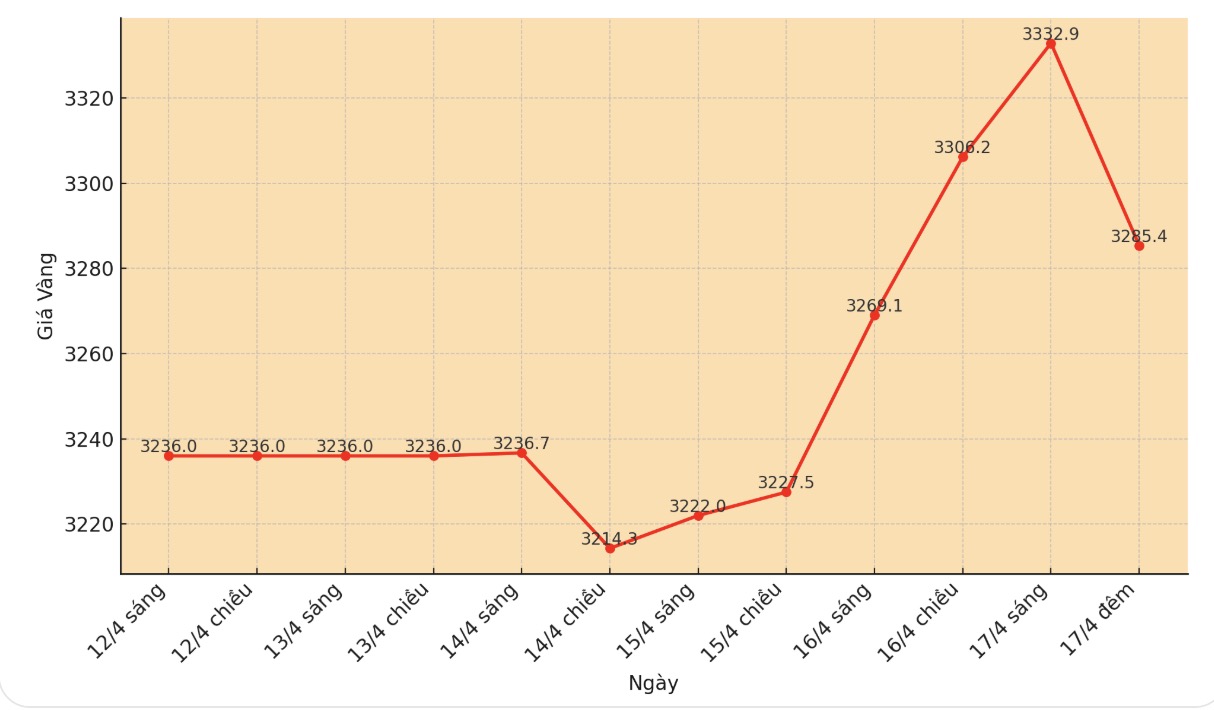In an interview with Kitco News, Mike McGlone - senior commodity strategist at Bloomberg Intelligence said that the recent increase in gold prices may be just the beginning of another strong increase.
This expert believes that gold prices could reach $4,000/ounce, in the context of traditional safe-haven channels gradually losing their effectiveness, Bitcoin weakening and the US stock market at too high valuations.
Currently, gold is forming a fairly solid foundation around the $3,000/ounce mark. Prices will move towards 4,000/ounce, the problem is just time. The price gap between these two levels is just a playground for speculators, like me before, McGlone said.

Since the beginning of the year, gold has increased by nearly 25% thanks to central bank demand, capital flows into ETFs and increased economic instability.
Goldman Sachs (one of the world's largest financial and banking groups, headquartered in New York, USA) also recently raised its year-end gold price forecast to $3,700/ounce and said that the precious metal could reach $3,900/ounce if the economy recessioned.
McGlone believes that gold's strength reflects a shift in capital flows from speculative assets. Gold is currently the most expensive ever compared to US long-term bonds. This shows that the burden of public debt is too great, while tax policies push inflation up, he said.
In contrast, Bitcoin and stocks are losing momentum. McGlone said the US stock market has evaporated $6,000 billion in capitalization since the beginning of the year, half of the increase in 2023.
Last year the market increased by 12,000 billion USD, now it has lost half. It was the biggest pumping in history, and it is now being withdrawn, he said.

According to McGlone, Bitcoin may have peaked. Cash flow into Bitcoin ETFs is declining, and the gold/ Bitcoin ratio is trending down. Currently, this rate is 26, our model shows that it will continue to fall below 17 in the fourth quarter of last year.
Bitcoin is still a highly speculative asset and is starting to slow down. Many people say this is an opportunity to buy, but I don't think so" - he said
Bloomberg Intelligence predicts that if the US falls into recession, the S&P 500 could fall to the 4,000-point mark a decrease of nearly 25% compared to the present.
McGlone added: The US stock market is currently at an all-time high against the rest of the world and against domestic GDP. And now it has a reason to adjust.
inflation in US consumer expectations is also deteriorating. According to a survey by the University of Michigan, annual inflation expectations have just jumped to 6.7% the highest since 1981, while the Fed has yet to take any further action.
We have pumped too much liquidity... and the Fed has kept interest rates low for too long. They did not tighten the policy until the first quarter of 2022, which is a step back. Then it gets too tight, McGlone said.
He said the asset effect is reversing. We have lost $6,000 billion in market value since the beginning of the year, equivalent to 10% of US GDP. Maybe this time is different, but I don't think so."
McGlone also pointed out that the stock market is being seriously distorted by GDP and other countries. There have been only two periods in history when market capitalization doubled GDP: 1929 in the US and 1989 in Japan. Now it is 2025 and we are at that threshold.
He also warned about global easing signals, especially from China and Germany. Chinas 10-year bond yield is just 1.66%, while the US is 4.4%. This distance will need to be adjusted. I think US bond yields will fall below 3%, the problem is just when.
When asked where to invest when both stocks and bonds are less attractive, McGlone replied directly: People are withdrawing from US stocks and pouring into gold. This year's ETFs show that.
Regarding stocks of gold mining companies, which are lagging behind gold prices, " McGlone admitted that many investors were disappointed, but still believed that this group of stocks would have room to increase if gold prices continued to climb.
Finally, McGlone believes this could be a "generational resettlement." This is a turning point in thrift policies, in tariffs, and it is happening right at the time when asset prices are being pushed too high. We have delayed the adjustment for too long, but I think it is happening.










